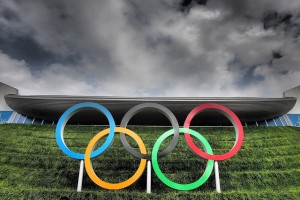IOC policy: no change for athletes with intersex traits

Photo by Farrukh of the aquatic centre, London Olympics. CC by NC 2.0 via Flickr.
In the past few weeks, new IOC policy positions on both gender identity and sex characteristics have been published. The statements have received widespread media coverage, focused mostly on improved (albeit imperfect) access to competition for trans athletes.
The IOC “consensus meeting” policy paper is dated November 2015, and it contains two statements, one entitled “Transgender guidelines” and one entitled “Hyperandrogenism in female athletes”. One is is still medicalised; the other makes an attempt to acknowledge human rights concerns.
The policy on transgender athletes enables participation without surgical anatomical changes, and it permits trans women to compete as their gender, after a year with testosterone levels below an arbitrary threshold. Even more welcome is a recognition that the treatment of transgender athletes has human rights implications.
The policy on intersex women athletes, termed “hyperandrogenism in female athletes” is, by contrast, cursory, with a markedly different tone. It lacks acknowledgement of any human rights implications, and it seeks to reinstate a un-evidenced policy that was suspended by the Court of Arbitration in Sport in July 2015.
Given the use of that existing framework to coercively sterilize and modify the genitals of intersex women athletes, this is disturbing.
The IOC framework suggests that it is not discriminatory for women with hyperandrogenism to be assigned to male competition.
Overall, both policy statements reinforce the idea that a testosterone level of 10nmol/l divides males from females. This is despite an acknowledgement in medical papers by sports clinicians that this level is arbitrary.
The impact on intersex women athletes is to reinforce stigma, humiliation and discrimination. As seems to be the case with “consensus” documents, membership of a consensus consultation group is adjusted in order to achieve a common viewpoint.
We are aware that the UN Special Rapporteur on Health is currently undertaking a study on sport and healthy lifestyles, and a report is due prior to the Rio 2016 Olympics.
More information
The current policy statements:
- IOC Consensus Meeting on Sex Reassignment and Hyperandrogenism November 2015
- Exclusive: Read the Olympics’ new transgender guidelines that will not mandate surgery, Outsports, 21 January 2016
- IOC rules transgender athletes can take part in Olympics without surgery, The Guardian, 25 January 2016
Some background and previous statements by OII Australia:
- Dutee can run! 7 August 2015
- Human Rights Commission submission on intersex policy reform and services, 6 February 2015
- No scientific basis for current policy excluding elite intersex women from sport, 22 August 2014
- Let Dutee Chand run, 25 July 2014
- Submission on the Sex Discrimination Amendment (Sexual Orientation, Gender Identity and Intersex Status) Bill 2013, 23 April 2013
You must be logged in to post a comment.